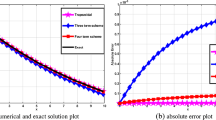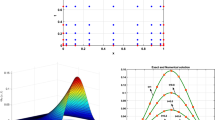Abstract
This research article is dedicated to solving multiple roots of real life problems. In the literature, there are numerous higher-order multiple root algorithms with derivative. But, derivative-free algorithms for multiple roots, on the other hand, are extremely rare. As a result of this, we describe a family of third-order derivative-free algorithms for calculating multiple roots that only require three function evaluations each iteration. The application of new algorithms is validated on Shokley diode and electric circuit problem, Isothermal continuous stirred tank reactor problem, Van der Waals problem and Planck law radiation problem. The presented iterative algorithms are good rivals to the existing algorithms, according to numerical results.
Similar content being viewed by others
References
Behl, R., Zafar, F., Alshormani, A.S., Junjua, M.U.D., Yasmin, N.: An optimal eighth-order scheme for multiple zeros of unvariate functions. Int. J. Comput. Meth. (2018). https://doi.org/10.1142/S0219876218430028
Bradie, B.: A Friendly Introduction to Numerical Analysis. Pearson Education Inc., New Delhi, India (2006)
Dong, C.: A family of multipoint iterative functions for finding multiple roots of equations. Int. J. Comput. Math. 21, 363–367 (1987)
Douglas, J.M.: Process Dynamics and Control. Prentice Hall, Englewood Cliffs, USA (1972)
Geum, Y.H., Kim, Y.I., Neta, B.: A class of two-point sixth-order multiple-zero finders of modified double-Newton type and their dynamics. Appl. Math. Comput. 270, 387–400 (2015)
Hansen, E., Patrick, M.: A family of root finding methods. Numer. Math. 27, 257–269 (1977)
Khoury, R.: Douglas Wilhelm Harder, Numerical Methods and Modelling for Engineering. Springer International Publishing, Berlin, Germany (2017)
Kumar, S., Kumar, D., Sharma, J.R., Cesarano, C., Agarwal, P., Chu, Y.M.: An optimal fourth order derivative-free numerical algorithm for multiple roots. Symmetry (2020). https://doi.org/10.3390/sym12061038
Kumar, D., Sharma, J.R., Argyros, I.K.: Optimal one-point iterative function free from derivatives for multiple roots. Mathematics (2020). https://doi.org/10.3390/math8050709
Kumar, D., Sharma, J.R., Cesarano, C.: An efficient class of Traub-Steffensen-type methods for computing multiple zeros. Axioms (2019). https://doi.org/10.3390/axioms8020065
Li, S., Liao, X., Cheng, L.: A new fourth-order iterative method for finding multiple roots of nonlinear equations. Appl. Math. Comput. 215, 1288–1292 (2009)
Li, S.G., Cheng, L.Z., Neta, B.: Some fourth-order nonlinear solvers with closed formulae for multiple roots. Comput Math. Appl. 59, 126–135 (2010)
Neta, B.: New third order nonlinear solvers for multiple roots. App. Math. Comput. 202, 162–170 (2008)
Osada, N.: An optimal multiple root-finding method of order three. J. Comput. Appl. Math. 51, 131–133 (1994)
Schröder, E.: Über unendlich viele Algorithmen zur Auflösung der Gleichungen. Math. Ann. 2, 317–365 (1870)
Sharma, J.R., Kumar, S., Jäntschi, L.: On a class of optimal fourth order multiple root solvers without using derivatives. Symmetry (2019). https://doi.org/10.3390/sym11121452
Sharma, J.R., Kumar, S., Argyros, I.K.: Development of optimal eighth order derivative-free methods for multiple roots of nonlinear equations. Symmetry (2019). https://doi.org/10.3390/sym11060766
Sharma, J.R., Kumar, S., Jäntschi, L.: On derivative free multiple-root finders with optimal fourth order convergence. Mathematics (2020). https://doi.org/10.3390/math8071096
Sharma, J.R., Sharma, R.: Modified Jarratt method for computing multiple roots. Appl. Math. Comput. 217, 878–881 (2010)
Sharifi, M., Babajee, D.K.R., Soleymani, F.: Finding the solution of nonlinear equations by a class of optimal methods. Comput. Math. Appl. 63, 764–774 (2012)
Soleymani, F., Babajee, D.K.R., Lotfi, T.: On a numerical technique for finding multiple zeros and its dynamics. J. Egypt. Math. Soc. 21, 346–353 (2013)
Traub, J.F.: Iterative Methods for the Solution of Equations. Chelsea Publishing Company, New York (1982)
Victory, H.D., Neta, B.: A higher order method for multiple zeros of nonlinear functions. Int. J. Comput. Math. 12, 329–335 (1983)
Weerakoon, S., Fernando, T.G.I.: A variant of Newton’s method with accelerated third-order convergence. Appl. Math. Lett. 13, 87–93 (2000)
Wolfram, S.: The Mathematica Book, 5th edn. Wolfram Media, Champaign (2003)
Zhou, X., Chen, X., Song, Y.: Constructing higher-order methods for obtaining the multiple roots of nonlinear equations. J. Comput. Appl. Math. 235, 4199–4206 (2011)
Author information
Authors and Affiliations
Corresponding author
Additional information
Publisher's Note
Springer Nature remains neutral with regard to jurisdictional claims in published maps and institutional affiliations.
Rights and permissions
About this article
Cite this article
Kumar, S., Kumar, D. & Kumar, R. Development of cubically convergent iterative derivative free methods for computing multiple roots. SeMA 80, 415–423 (2023). https://doi.org/10.1007/s40324-022-00300-6
Received:
Accepted:
Published:
Issue Date:
DOI: https://doi.org/10.1007/s40324-022-00300-6
Keywords
- Stirred tank reactor problem
- Van der Waals problem
- Convergence
- Derivative-free algorithms
- Multiple roots




